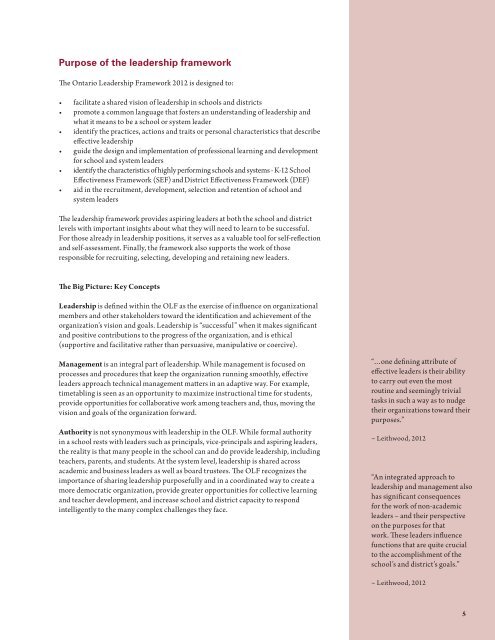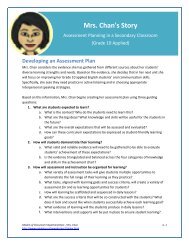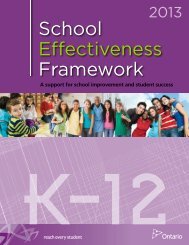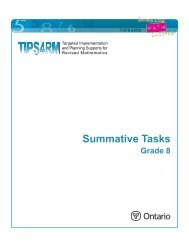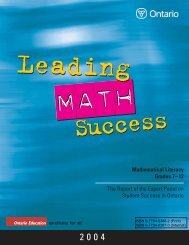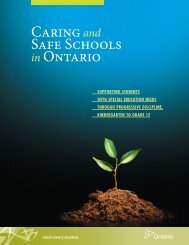The Ontario Leadership Framework 2012
THE ONTARIO LEADERSHIP FRAMEWORK 2012 - EduGAINS
THE ONTARIO LEADERSHIP FRAMEWORK 2012 - EduGAINS
Create successful ePaper yourself
Turn your PDF publications into a flip-book with our unique Google optimized e-Paper software.
Purpose of the leadership framework<strong>The</strong> <strong>Ontario</strong> <strong>Leadership</strong> <strong>Framework</strong> <strong>2012</strong> is designed to:• facilitate a shared vision of leadership in schools and districts• promote a common language that fosters an understanding of leadership andwhat it means to be a school or system leader• identify the practices, actions and traits or personal characteristics that describeeffective leadership• guide the design and implementation of professional learning and developmentfor school and system leaders• identify the characteristics of highly performing schools and systems - K-12 SchoolEffectiveness <strong>Framework</strong> (SEF) and District Effectiveness <strong>Framework</strong> (DEF)• aid in the recruitment, development, selection and retention of school andsystem leaders<strong>The</strong> leadership framework provides aspiring leaders at both the school and districtlevels with important insights about what they will need to learn to be successful.For those already in leadership positions, it serves as a valuable tool for self-reflectionand self-assessment. Finally, the framework also supports the work of thoseresponsible for recruiting, selecting, developing and retaining new leaders.<strong>The</strong> Big Picture: Key Concepts<strong>Leadership</strong> is defined within the OLF as the exercise of influence on organizationalmembers and other stakeholders toward the identification and achievement of theorganization’s vision and goals. <strong>Leadership</strong> is “successful” when it makes significantand positive contributions to the progress of the organization, and is ethical(supportive and facilitative rather than persuasive, manipulative or coercive).Management is an integral part of leadership. While management is focused onprocesses and procedures that keep the organization running smoothly, effectiveleaders approach technical management matters in an adaptive way. For example,timetabling is seen as an opportunity to maximize instructional time for students,provide opportunities for collaborative work among teachers and, thus, moving thevision and goals of the organization forward.Authority is not synonymous with leadership in the OLF. While formal authorityin a school rests with leaders such as principals, vice-principals and aspiring leaders,the reality is that many people in the school can and do provide leadership, includingteachers, parents, and students. At the system level, leadership is shared acrossacademic and business leaders as well as board trustees. <strong>The</strong> OLF recognizes theimportance of sharing leadership purposefully and in a coordinated way to create amore democratic organization, provide greater opportunities for collective learningand teacher development, and increase school and district capacity to respondintelligently to the many complex challenges they face.“…one defining attribute ofeffective leaders is their abilityto carry out even the mostroutine and seemingly trivialtasks in such a way as to nudgetheir organizations toward theirpurposes.”~ Leithwood, <strong>2012</strong>“An integrated approach toleadership and management alsohas significant consequencesfor the work of non-academicleaders – and their perspectiveon the purposes for thatwork. <strong>The</strong>se leaders influencefunctions that are quite crucialto the accomplishment of theschool’s and district’s goals.”~ Leithwood, <strong>2012</strong>5


